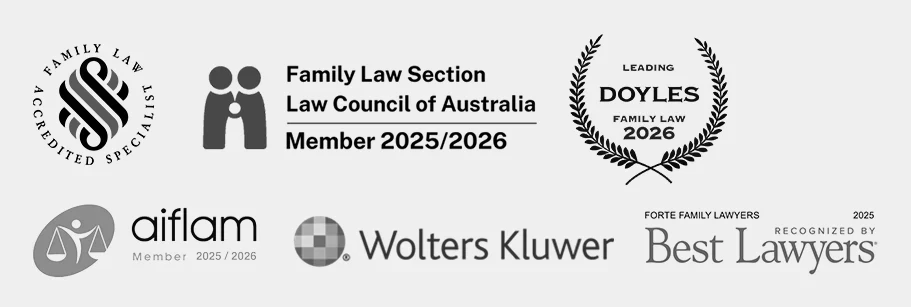Family Violence Lawyers Melbourne
Dealing with domestic violence and family violence matters can be emotionally distressing and challenging to manage without support. Our dedicated team of Melbourne family violence lawyers provide compassionate advice and legal solutions, prioritising our clients’ personal safety and wellbeing.
Book an appointment today with our trusted family violence lawyers in Melbourne.


Domestic Violence Lawyers
Our Melbourne Family Violence Lawyers Provide Dedicated & Compassionate Legal Support
If you are facing violence in an intimate personal relationship, or at home, our highly experienced team can assist you with all aspects of legally addressing the situation. We understand the distinct challenges faced by people who are experiencing family violence, and the effect it can have on any family law matters that you are also resolving.
You can trust that the team at Forte Family Lawyers will provide you with the support, advice and representation required to face your matter with peace of mind.
Why seek advice from our family violence lawyers?
Extensive Experience
Work with a team that has a wealth of experience in handling sensitive and complex family violence cases.
Accredited Specialists
We have lawyers who are Accredited Family Law Specialists, recognised for their high standards of expertise in family violence matters.
Compassionate Guidance
We provide clear, empathetic, and practical advice to support you through what can be a deeply emotional and challenging time.
Book an Appointment
Get started by booking an appointment with one of our team members.
"*" indicates required fields
How can our team help?
Our team understands how complex family violence matters can be and the importance of dealing with them in a sensitive yet proactive manner. We know that dealing with intimate partner violence can bring up many mixed feelings and is further complicated when there are children involved. In addition, we are aware that some forms of violence are hidden or less obvious and that addressing these behaviours can be difficult.
We work with people who are experiencing family violence in the following ways:
- Assisting with obtaining family violence orders (IVOs)
- Representation if you have a court date for an intervention order proceedings
- Managing other family law matters such as divorce, separation and parenting matters that are impacted by family violence
- Child protection matters, including supervised contact or visitation arrangements
- Contesting or responding to orders
I need immediate help with family violence; who can I contact?
If you’re in immediate danger, call 000 for emergency help. You can also contact local domestic violence services, such as 1800RESPECT (1800 737 732), or seek advice from a family lawyer or community legal centre for support and guidance.
What are my legal options to address family violence in Victoria?
In Victoria, individuals experiencing family violence have several legal options for protection, including applying for a Family Violence Intervention Order (IVO) to ensure their safety. There are also multiple avenues to seek legal advice for ongoing support and access to resources like support services and counselling. If family violence is affecting co-parenting matters, applications for supervised time, sole care or sole parental responsibility can be made.
What is an IVO?
A Family Violence Intervention Order (IVO) is a court order that protects a person from family violence, including physical, emotional or psychological harm, financial abuse, coercion and control. It can place restrictions on the accused person, such as limiting contact or ordering them to stay away from the protected person.
What is the process for getting an Intervention Order in Victoria?
In Victoria, there are two types of intervention orders, which are family violence IVOs and personal safety IVOs. Both orders are similar, but personal safety orders are for people who have not been in a close or intimate relationship with the person who is perpetrating the violence.
An order in Victoria can be made urgently by police or by the affected individual’s application to the Magistrate’s Court (this can also be done on behalf of another family member, such as children or relatives).
- Seek legal advice or contact your local Magistrates court for an application. Applications are free to make.
- Report any incidents, including stalking, threats, physical violence, sexual violence or coercive control, to the police or a domestic violence support centre. Police may apply for an IVO on your behalf, especially in cases of serious harm, sexual assault, or threats of harm.
- The IVO application is heard in a local court. The person accused will usually not be notified at the time, and will not know about the application until they are served with an interim IVO.
- You must attend court on the scheduled date to provide evidence. Please speak to your support person or lawyer if you have safety fears regarding the hearing.
- If an IVO is made and the accused breaches the order, they may face criminal charges, a criminal record and possibly a prison sentence. They may also face criminal charges if the events relied upon for the IVO are dealt with as a criminal matter.
- In family law cases, an IVO can affect parenting matters, as the safety and best interests of children are relevant. It’s important to ensure you have the support required to navigate the legal system while managing family violence. If you are experiencing domestic violence or family violence, please talk to our team about how we can assist.
What types of family violence intervention orders can be made?
Here’s a brief explanation of a Police Order, Interim Order, and Permanent Order in the context of family violence in Victoria:
- Police Order:
The police issue a police order or safety notice if they believe there is an immediate risk of harm. It is a temporary order that can provide protection before a court hearing. The order can last up to 72 hours and can include conditions like no contact with the victim or staying away from the home. - Interim Order:
An Interim Intervention Order (IVO) is a temporary court-ordered Family Violence Intervention Order (IVO) that provides immediate protection while the case is being decided. It is in place until a final court hearing occurs. It can last several weeks or months. - Permanent Order:
A Permanent Order is a final IVO issued by the court after a full hearing. It can last for an extended period, often up to 2 years or more, and provides long-term protection with conditions that restrict the abuser’s behaviour. At the end of this period, the victim/s can apply for an extension of the IVO.
Meet Our Team Of Family Law Specialists
Our team can guide you through every aspect of domestic violence and family violence, separation and family law.
Customer Reviews
Frequently Asked Questions
What is family violence?
If you are experiencing family violence and in immediate danger, please call 000.
In Victoria, the Family Violence Protection Act 2008 (Vic) (“FVPA”) governs family violence and intervention orders. Family violence includes behaviour by a person towards a family member (the affected family member) that is:
- Physically or sexually abusive
- Emotionally or psychologically abusive
- Economically abusive
- Threatening or coercive
- Any other behaviour that controls or dominates the family member and causes them to fear for their safety or wellbeing or for the safety or wellbeing of another person.
Family violence also includes behaviour by a person that causes a child to hear, witness or be exposed to the effects of family violence. The behaviour does not have to be a criminal offence to be family violence. Please get in touch with our Melbourne domestic violence and family violence lawyers for further assistance in this area.
What are the types of family violence?
The Family Law Act 1975 (Cth) (“FLA”) governs family violence in family law proceedings in the Commonwealth Courts. Family violence is defined as violent, threatening, harmful behaviour by a person that coerces or controls a member (or members) of the person’s family (the family member) or causes the family member to be fearful.
Physical or sexual abuse
This can include assault or causing personal injury to a family member, sexually assaulting a family member, engaging in sexually coercive behaviour or threatening such behaviour.
Emotional or psychological abuse
Emotional or psychological abuse means behaviour by a person towards another person that torments, intimidates, harasses or is offensive to the other person.
This can include repeated derogatory taunts, preventing a person from making or keeping connections with the person’s family, friends or culture, and threatening to commit suicide or self-harm with the intention of intimidating a family member or threatening the death or injury of another person.
Economic abuse
Economic abuse is behaviour that is coercive, deceptive and unreasonably controls another person without that person’s consent in a way that undermines that person’s economic or financial autonomy or withholds or threatens to withhold financial support necessary for reasonable living expenses.
This can include preventing a person from having access to joint financial assets for the purposes of meeting normal household expenses, disposing of property owned by a person or owned jointly with a person against the person’s wishes and without lawful excuse, and coercing a person to relinquish control over assets and income.
Coercion or control, coercive control fear for safety
Any behaviour that coerces, controls or causes the family member to be fearful for their safety or wellbeing or for the safety or wellbeing of another person is family violence.
Examples include intentionally harming or threatening to harm an animal, damaging or threatening to damage property, preventing the family member from keeping connections with friends or family, denying their liberty or stalking.
A child hearing, witnessing or otherwise exposed to any of the above
A child can be exposed to family violence by overhearing threats, seeing or hearing an assault, providing or comforting assistance to a family member who has been physically abused by another family member, or cleaning up a site after a family member has intentionally damaged another family member’s property.
How does family violence affect parenting matters?
Family violence can significantly impact parenting matters, as the safety and wellbeing of children are the Federal Circuit and Family Court’s primary concern. In situations of family violence, courts may limit or supervise the abusive parent’s contact with the children. The court may also make orders for protection, such as supervised visits, restricted parenting time or no contact, to ensure the child’s safety and emotional health.
Recent changes to family law in Australia emphasise the importance of protecting children from harm, including the effects of family violence. Under the Family Law Amendment (Family Violence and Other Measures) Act 2018 and the recent 2024 Family Law Act Amendments, the courts now have a greater focus on the safety of children and family violence when making decisions about parenting arrangements.
How does family violence affect property settlement?
Family violence can influence property settlement in divorce or separation proceedings. If family violence is proven, it may affect the way assets are divided as courts consider the impact of abuse on the victim’s financial and emotional wellbeing. In some cases, the abusive partner may receive a smaller share of the property or assets to account for the harm caused by their behaviour.
Recent reforms in Australian family law have strengthened how family violence is considered in property settlements. The Family Law Amendment (Family Violence and Other Measures) Act 2018 and 2024 Family Law Amendments have made it clear that the impact of family violence can be a relevant factor in the division of property. The courts now have more discretion to adjust the property settlement to reflect the abuse, such as awarding a greater share of assets to the victim of family violence. These changes aim to ensure that victims are not disadvantaged by the abuse they experienced when determining financial settlements.
Is family violence a criminal offence?
An intervention order is not a criminal matter; it is a civil matter. A Family Violence Intervention Order (IVO) is a court order aimed at protecting individuals from family violence. It places conditions on the alleged abuser, like no contact or staying away. The burden of proof is lower, and the order focuses on safety, not punishment.
A criminal charge is a formal accusation made by the police for offences like assault or sexual violence. The prosecution must prove the crime beyond a reasonable doubt. If convicted, the offender may face penalties like fines or imprisonment. Breaches and certain types of family violence are criminal offences in Australia, though. Offences such as assault, stalking, sexual violence, and threats within a family or domestic context are punishable under criminal law.
What is the punishment for domestic violence in Australia?
Punishments for domestic violence in Australia vary based on the severity of the offence. Convictions may result in fines, restraining orders, or imprisonment. Serious cases of physical or sexual violence can lead to long prison sentences.
What are the four ways of handling domestic violence?
- Seek legal protection: Apply for an IVO or other legal protections.
- Police intervention: Report to the police for investigation and potential charges.
- Support services: Access domestic violence support services for assistance and guidance.
- Counselling & therapy: Seek counselling for both the victim and the perpetrator to address underlying issues.
I feel I've had a Family Violence Intervention Order placed on me incorrectly; what can I do?
If you believe an IVO has been placed on you incorrectly and you have not committed family violence, you can contest the order in court. You should seek legal advice from a professional family violence lawyer to help you understand your rights and options.
In Victoria, breaching a Family Violence Intervention Order (IVO) can result in serious penalties. The penalties depend on the severity of the breach.
Contact Forte Family Lawyers
CONTACT
Our professional Family Lawyers in Melbourne are ready to listen.
Level 15
600 Bourke Street
Melbourne 3000 Victoria Australia
PO Box 13172
Law Courts
8010 Victoria Australia
Telephone
+61 3 9248 5800
Email
enquiries@fortefamilylawyers.com.au

"*" indicates required fields




